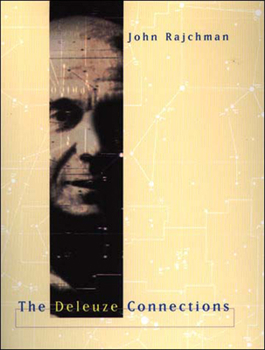The Deleuze Connections
Select Format
Select Condition 
Book Overview
The first book to present Gilles Deleuze's philosophy in language the nonphilosopher can understand. This book is a map of the work of Gilles Deleuze--the man Michel Foucault would call the "only real philosophical intelligence in France." It is not only for professional philosophers, but for those engaged in what Deleuze called the "nonphilosophical understanding of philosophy" in other domains, such as the arts, architecture, design, urbanism,...
Format:Paperback
Language:English
ISBN:026268120X
ISBN13:9780262681209
Release Date:October 2000
Publisher:MIT Press
Length:176 Pages
Weight:0.54 lbs.
Dimensions:0.5" x 5.3" x 8.0"
Age Range:18 years and up
Grade Range:Postsecondary and higher
Customer Reviews
2 ratings
another piece of the puzzle
Published by Thriftbooks.com User , 21 years ago
It's true that this book is missing the kind of rich examples that make Deleuze such a pleasure to read, but Rajchman is doing something else here. Unlike those who carefully police "what deleuze means," and pounce on "mis-interpretations" of his work, Rajchman opens up Deleuze rather than closing him off. This is a little book--to be read over a week on the subway--that expands our idea of what Deleuze can mean, rather than attempting to nail down what he DOES mean. I would respectfully disagree with the reader who suggests Massumi's book as an intro instead. BM's best work--and it's truly lovely--is his brief intro to "1000 Plateaus." His "Users Guide" is, alas, a mess. It falls into the same trap that the (formerly light-hearted) Delanda seems to have ensnared himself in. Why can't we take Deleuze as lightly as Deleuze took himself? Delanda used to drive the getaway car for Joe Coleman; what happened?
Necessary Reading for Understanding Deleuze
Published by Thriftbooks.com User , 23 years ago
Before reading this articulate and concise book that covers the philosophy of Gilles Deleuze, I had only a rather vague conception of the central ideas inherent in the work of Deleuze. Although I thought I understood many of the implicit ideas communicated in works such as 'Anti-Oedipus', 'What is Philosophy?', and 'A Thousand Plateaus', I still acknowledged my mental discomfort that seemed only to increase exponentially after each successive book I read in the corpus of Deleuze. That is, Deleuze's thought is not as tractable as most philosophers, whose works are easily comprehended and accessible once compared to the tradition of thinkers whose intellectual footsteps they have followed. Deleuze is in no way traditional, save for his unremitting reflection on the past ideas of philosophers. Thus, acquiring an insight of Deleuze's methodology is necessary for a genuinely inquiring philosopher, for his method is not readily apparent, and moreover often seems impenetrable. 'The Deleuze Connections' provides a lucid and comprehensive analysis of Deleuze's fairly idiosyncratic method. The highlight of Rajchman's exposition is the chapter entitled 'Multiplicity', in which he delicately unveils the rather unconventional logic that Deleuze often applies when theorizing. As a PhD candidate in Philosophy, I found Rajchman's 'The Deleuze Connections' to be absolutely essential for understanding the often cited, yet scarcely explained philosophy of Gilles Deleuze.






